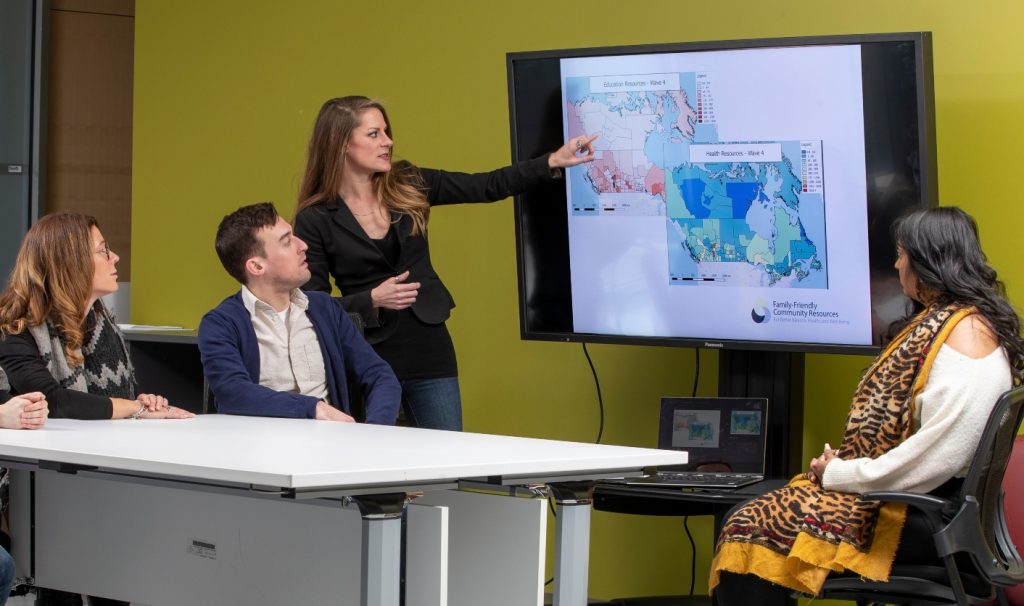Marisa Young helps stressed-out families with work-life balance

Marisa Young, standing, is leading a study that looks at whether community supports help improves working parents' mental health by making it easier to balance the demands of work and family life. (Photo by Georgia Kirkos)
BY Sonia Verma
March 12, 2020
When you ask Marisa Young about her research, she tells you about the nurse.
“She’s a nurse. He drives a taxi,” Young begins. “He works days; she works nights so she can take care of the kids in the day. By the time she gets home from her night shift, she’s so tired, she ends up falling asleep before her husband gets up. They don’t see much of each other.
“That’s their life. Day in, day out.”
While the nurse and cabbie are an extreme example, Young says the average working family in Canada has normalized a high level of stress, trying to balance the demands of work and family life.
“Parents endure chronic stress of work-family conflict on a daily basis,” Young says. “It’s just part of everyday life now.”
“We trivialize work-family conflict like it’s no big deal, with no consequence on health and well-being.”
But chronic stress like that does take a toll on people — on their health and well-being, on their performance at work, on their relationships and ultimately, on children.
Young wants to change all that.
She is leading an ambitious research project that examines how community supports for working families can ease work-family conflict and improve stressed-out parents’ mental health.
Young’s Family Friendly Community Resources For Better Balance, Health And Well-Being project is funded by SSHRC and her provincial Early Researcher Award.
Family-friendly community resources are things like recreation facilities, access to safe, affordable childcare, libraries and educational programs that might help parents navigate work-family conflict that would otherwise become stressors.
Young’s research also covers less tangible aspects of family-friendly communities — things like forging stronger social connections within neighbourhoods, so parents will feel less stress, knowing that they have a network of friends and neighbours who could help them in a bind.
Communities across Canada
The cross-Canadian project is the first of its kind, and sources of data vary immensely by location. “There’s no single source of information on food sources, recreation, libraries, child care and other supports,” Young says, so her team has painstakingly sourced and cleaned up a mass of complicated data.
After that, they matched the community-level data with ongoing surveys of 6,000 Canadians’ experiences with work-life balance, which Young began in 2011. The same people respond to a survey every two years.
“It’s a huge task,” she says. “I’m lucky to have such an excellent research team.”
The project is in year three of its initial five-year grant.
Eventually, Young would like to make her massive repository of data available to other researchers.
Investing in the future
Young has always been interested in work-life balance and mental health, and her current project saw its genesis in her doctoral work on neighbourhood resources in Toronto.
But she also sees the pressure her friends and colleagues face every day as they struggle to balance demanding careers with sleep deprivation and concerns about child care, long hours, expenses and parental guilt.
“I think it’s one of the most pressing matters that we have to think about today,” Young says. “And the goal of my research is to make that better.”
Scandinavian countries, which invest heavily in child care and social supports for families, are a great example of a successful work-family interface, Young says. Closer to home, work-family stress levels are lower in Quebec.
“In our individual-level data, you can see an ideal example happens to be in Quebec, where they have $7-a-day daycare,” Young says.
“It comes down to whether you have access to affordable, safe and convenient child care, as well as the philosophy of work and family where you live.”
Young would like to see that philosophy become a focal point for workplaces, communities and families as they work together to create solutions. Pivotal to that approach is recognizing that children really are our future, Young says.
“This is the next generation of people who will be sustaining our economy, providing care to us in the future. These will be the nurses and doctors and leaders and plumbers and workers of tomorrow.”
The workaholic
Young, a self-professed workaholic, doesn’t practise what she preaches.
She’s on research leave at the moment, and is supposed to use the time to focus on the Family Friendly Community Resources project.
“Instead, I’ve taken on more and more research projects,” she admits. The long list includes an international collaboration with researchers at Harvard and the WHO on student mental health.
“I have the worst work-life balance. But if my unfortunate workaholism contributes to other people achieving balance, I think it’s worthwhile.”


